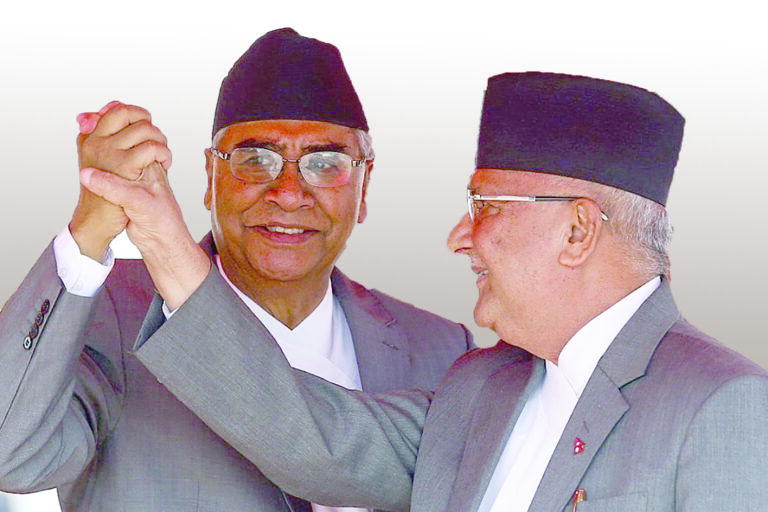

KATHMANDU: One year after Nepal’s two largest political rivals—Nepali Congress and CPN-UML—came together under a rare seven-point agreement to form a coalition government led by KP Sharma Oli, hopes for meaningful reform have largely given way to disillusionment.
The government, which vowed to amend the Constitution, ensure good governance, fight corruption, and restore political stability, now finds itself embroiled in controversies, internal rifts, and charges of inaction.
Even key leaders from the ruling parties, including top Nepali Congress officials, have publicly criticized the government’s underwhelming performance. Analysts say the seven-point deal has failed to go beyond power-sharing, with little substance to show on its core agenda.
Constitutional amendment: Stuck in political theater
A major commitment of the ruling alliance—amending the Constitution—has seen no visible progress. While both UML and Congress claim they are doing internal “homework,” the government has not even initiated formal debate in Parliament.
The Nepali Congress has formed a task force to prepare its amendment proposals and pledged to consult civil society and other stakeholders.
Meanwhile, UML says its Policy and Research Institute, led by senior vice-chair Ishwar Pokharel, is preparing reports based on discussions with experts and political figures.
Despite repeated pledges, Prime Minister Oli has admitted that constitutional amendment is unfeasible without a two-thirds majority—hinting it may be deferred until 2087 BS (2030–31). This effectively rules out any near-term progress.
The ruling coalition neither commands the required numbers nor shows genuine political commitment to pursue reforms, making any meaningful amendment unlikely before Oli’s own projected timeline.
Corruption scandals rock the Cabinet
The government’s anti-corruption promises are rapidly losing credibility amid a string of new scandals. Two current ministers—Raj Kumar Gupta (Federal Affairs) and Balaram Adhikari (Land Reforms)—have been implicated in leaked audio clips allegedly discussing bribes related to the transfer of government employees.
Despite the audio going viral on social media and news platforms, Prime Minister KP Sharma Oli has yet to take any action, drawing widespread criticism for his inaction.
Meanwhile, Home Minister Ramesh Lekhak is also under scrutiny over allegations linking him to a visa scam. Though no direct evidence has surfaced, opposition parties and civil society organizations are calling for an impartial investigation, accusing the government of protecting its ministers rather than ensuring accountability.
Analysts say the Prime Minister’s continued silence reflects deeper institutional rot. The government’s influence over key oversight bodies like the Commission for the Investigation of Abuse of Authority (CIAA) and the judiciary has further eroded public trust in the system.
Nepali Congress openly disappointed with coalition performance
The Nepali Congress, despite being the major coalition partner, has expressed dissatisfaction. At a Central Working Committee meeting on Asar 23 (July 7), party leaders criticized the government’s failure to deliver on its reform commitments.
Nepali Congress publicity chief Min Bishwakarma noted, “The government’s pace is slow and cannot address public aspirations. We are not demanding a change of government, but its working style must drastically improve.”
He added that the party formed a task force for constitutional amendment, aiming to push forward key bills in 2025 after failing to do so in 2024.
Economy: Improvement in indicators, targets missed
The government claims it has improved economic fundamentals, pointing to improved liquidity, falling interest rates, and better service delivery—such as faster distribution of passports and national IDs. However, the broader picture is mixed.
The economy is projected to grow at 4.61% this fiscal year, short of the 6% target. Public debt has climbed to over Rs 2.65 trillion.
Capital expenditure remains low, while the trade deficit is widening. Despite over Rs 900 billion in bank liquidity, the private sector has been hesitant to borrow due to political uncertainty.
Investment remains stagnant, government spending is low, and employment generation has come to a halt. The government has also failed to meet its own development targets.
Education falters, health shows modest gains
The education sector remains deeply problematic. Two ministers—Bidya Bhattarai and later Raghuj Panta—have served in just one year.
Despite promises, the government has not introduced the long-awaited School Education Bill, even after a 29-day nationwide teachers’ protest. The education ministry has only achieved minor policy reviews on early childhood and teacher positions.
On the brighter side, Health Minister Pradeep Paudel has earned praise for steady, targeted interventions.
These include partnerships for hospital equipment repair, HPV vaccine distribution, expansion of cancer and heart disease treatment to all seven provinces, and efforts to institutionalize health insurance and demographic data.
Notable initiatives include free treatment for eight complex diseases, subsidies for costly cancer medications, and launch of Nepal’s first burn treatment units and organ transplant services outside the Kathmandu Valley.
A coalition adrift
Despite Prime Minister Oli’s repeated assertions that he will hand over power to Deuba before completing two years, his actions tell a different story. No roadmap exists. The political partnership appears increasingly transactional, lacking a coherent reform strategy.
From stalled constitutional reform to ongoing corruption scandals and disappointing results in governance, the Congress–UML coalition is now seen by many as a caretaker alliance preoccupied with internal survival rather than public service.
Analysts warn that if these trends continue, the government risks losing both legitimacy and public trust.